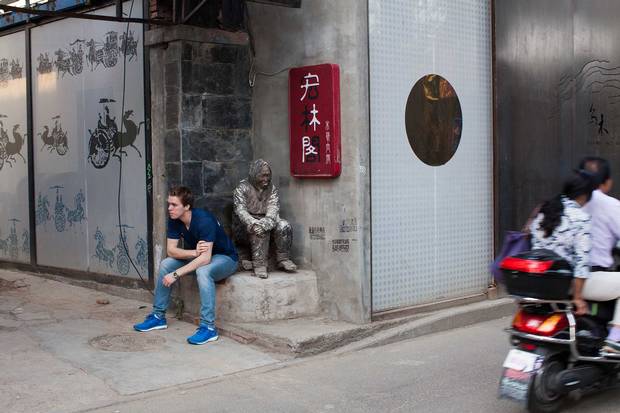Connor McDavid looks exhausted and more than a little lost as he walks into a room jammed with young Chinese hockey players, all of them clad in skates, pads and jerseys. The lanky Edmonton Oilers centre, drenched in sweat from Beijing's early-summer heat, raises his left hand in a wave and looks at the ground, smiling.
The day before, he'd knocked in the game-winning goal at the hockey World Championship in Moscow. Within hours of peeling off his Team Canada jersey, he boarded a plane headed nearly 6,000 kilometres east, to the Chinese capital. His first stop: Beijing 101 Middle School, dedicated to educating the next generation of Chinese Communist Party elite—China's president, Xi Jinping, once went here as he was being groomed for leadership. The tweens wait in a small knot next to a stamp-sized synthetic rink where McDavid will later swap shots with them.
McDavid—the National Hockey League's 2015 No. 1 draft pick and the most-watched young figure in the game—is the first active NHLer to come to China for an official visit. But he's not here at the behest of Gary Bettman (though the league's commissioner would love to conquer China and other international markets). Nor was he invited by Beijing's Olympic Committee, which is hosting the Winter Olympics in 2022 and hoping to kindle enough hockey excitement that it won't suffer home-ice embarrassment. He's here to promote a fluorescent-pink sports nutrition drink called BioSteel, a bottle of which McDavid clutches as he sits down in front of a giant red poster featuring a very un-Mao-like exhortation: #DRINKTHEPINK.
Watch: McDavid promotes hockey – and BioSteel – in China
1:16
BioSteel, McDavid tells the assembled kids, "is a famous sports drink in North America."
That might be pushing it. Yes, the brilliantly coloured beverage is guzzled by athletes and is the official sports drink of the Toronto Raptors. It has even earned itself a spot on supermarket shelves at home. But on the global market—dominated as it is by Gatorade—it might as well not exist. BioSteel and its CEO, John Celenza, have signed McDavid to help change that.
BioSteel is just one of eight endorsement deals the 19-year-old has signed over the past five years. Though he played just 45 games in a rookie season interrupted by injury—for a team that finished 29th out of 30 in the league—McDavid's image, and his promise, are already being used to sell hockey gear, banking services and trading cards. It doesn't take much imagination to see why his endorsement income already tops his $832,500 base salary (all currency in U.S. dollars).
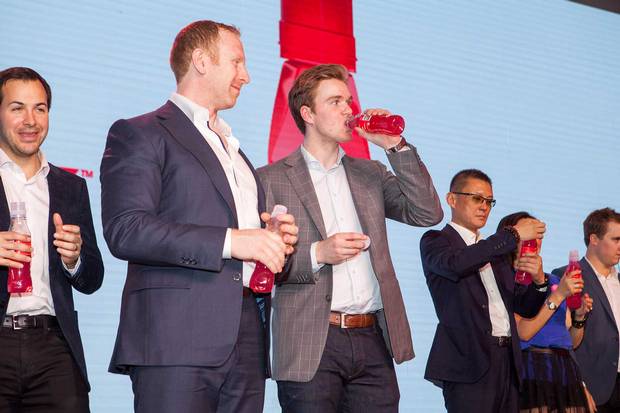
BioSteel’s official launch, in Beijing’s 798 art district.
Ever since Babe Ruth lent his name to everything from cigarettes to underwear nearly a century ago, the business of sport has, for the best and savviest players, also been the business of business. McDavid is surrounded by a team of agents and managers from Orr Hockey Group (started by the legendary stickman/pitchman Bobby Orr) who see in him an echo of another Oilers wunderkind: Wayne Gretzky. Like the Great One, McDavid is being positioned to be about more than slapshots and on-ice theatrics. They want him to be a global hockey icon—as potent an ambassador for the game as he is for the brands he reps.
Yet, the payoff for those brands isn't entirely clear. Each year, companies spend billions of dollars on celebrity endorsements (Nike alone spent $1 billion in 2016), knowing that the return on most such investments is nebulous. BioSteel's CEO likens them to "betting futures"—though he figures McDavid is as safe a bet as they come. "He's everything you want for your brand," says Celenza. "You talk about the purity of his life as solely focused toward being a better hockey player every day. That's kind of the message we're trying to get with what we do as well. It's a perfect fit."
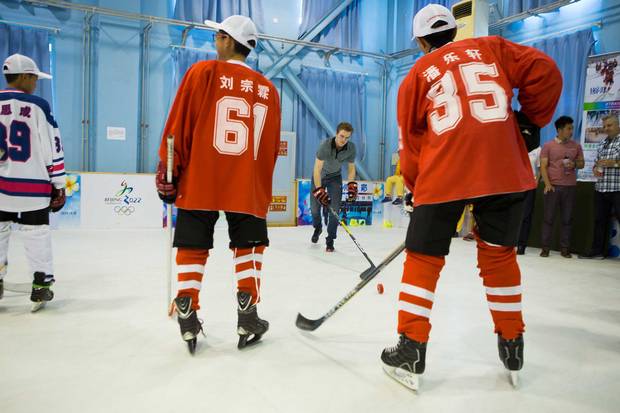
McDavid trades shots with students at the elite Beijing 101 Middle School.
If there's an ideal script for an NHL superstar's origin story, Connor McDavid has written it. He learned to skate when he was three years old, in his hometown of Newmarket, north of Toronto, and honed his skills slapping pucks at his grandmother. When he was 4, his parents lied about his age, tacking on an extra year so they could enroll him in the local hockey league. By primary school, anyone watching closely enough could see the seed of unique ability on the ice, which McDavid nurtured with relentless practice.
When he was 14, his older brother, Cameron, was invited to a hockey camp run by the Orr Hockey Group. Connor went, too. "I was a tagalong," he says.
When Orr himself saw Connor on the ice, he demanded to know who the kid was. Orr Group later signed McDavid, who was named player of the year in the Greater Toronto Hockey League the following season after racking up 72 points in 33 games. By the time the Ontario Hockey Federation granted him exceptional-player status—allowing him to join the Ontario Hockey League a year early, at age 15, a rare honour—CCM's parent company, Reebok, was handing McDavid free gear. His dad, Brian, had already started chatting with the sports-card company Upper Deck. (McDavid is now an "exclusive spokesman" for the company, which pays him to sign a set number of cards.)
In June, 2015, McDavid was drafted first by Edmonton, which was looking to rebuild a struggling franchise. (He chose No. 97, for the year of his birth—like his hero, Sidney Crosby, No. 87.) Which means that one of the game's hottest players is, once again, an Oiler. Companies see the rebirth of a legend—and not just on the ice.
A marketing manager would have a hard time devising a better spokesman than Gretzky. Not only was he the league's top scorer, but he was also amiable on television and guarded in his personal life (he often refused to go places alone with women, lest he be accused of wrongdoing). "He was the perfect personality," says Mike Barnett, the Great One's long-time agent. "I've often said that Idi Amin could have done the job representing him. He just invariably said and did the right thing on and off the ice for the better part of three decades."
That brought in a steady stream of endorsement deals—for cars, cereal, insurance, an airline, pizza and electronics. He even did a walk-on in a soap opera. And that hefty income stream has persisted even after he left the ice (a side benefit McDavid might soon appreciate, given that the average NHL career lasts just 5.5 years).
"Even today, to still be coveted by blue-chip companies long after he has quit playing—it's because they know what they're getting," says Barnett. "It's a cardinal rule: Don't try to create an image that you don't live every day."
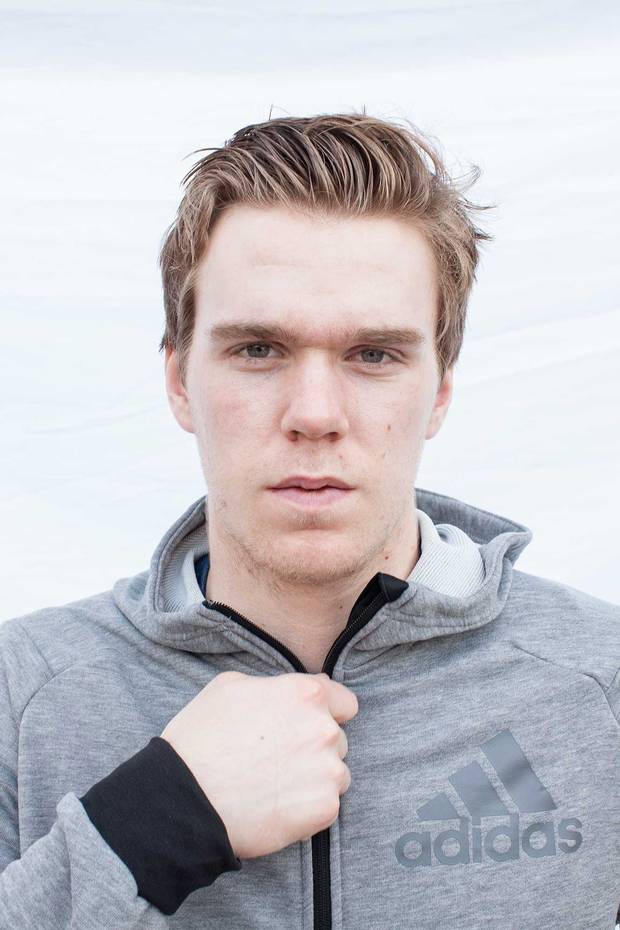
In person, McDavid is a picture of open-faced earnestness, with a desire not to be liked so much as to be solidly up-front. He's also got that Gretzky caution (indeed, Gretzky has already called McDavid to offer advice on navigating his dual life as player and brand ambassador). When the subject of Vladimir Putin comes up—after the World Championship, the Russian President showed up to hug the victors—Jeff Jackson, the lawyer and former NHL left-winger who is McDavid's agent, calls him "an evil man."
"Careful," McDavid whispers back, eyes wide as he points at a reporter's tape recorder. "It's being recorded."
McDavid admits he doesn't know a whole lot about his own business affairs. Sure, shooting commercials and hawking drinks are all "very interesting, and I try to have as much fun with it as I can," he says. And there are perks: He gets CCM skate prototypes delivered to him under wraps, cloak-and-dagger style. And he can text at any hour of the day to get a stick curved exactly to his liking. "It's great service," he says.
But on his priority list, that side of his career ranks well below winning a Stanley Cup or Olympic gold medal. "My job is hockey. I'm a hockey player," he says. "It's all about trusting the people around you."
Tell McDavid his whole "authenticity" approach seems hopelessly Canadian and he smiles.
"I like that," he says. "That's what we're going for."
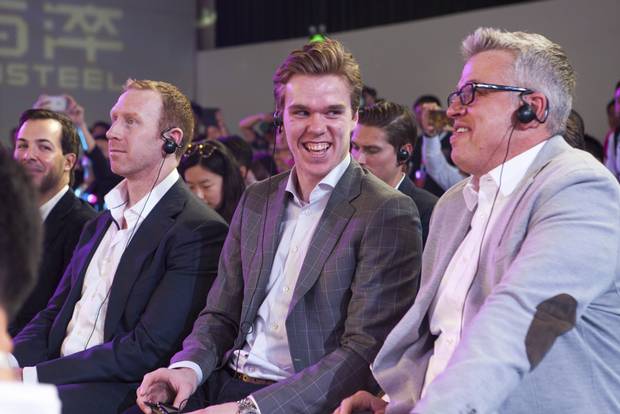
In a smartphone era where chances are the star in a Coke commercial will get caught—and photographed—sneaking a Pepsi, McDavid is trying a new approach: Don't sell the public a load of goods. So when Bauer offers you shares in the company to represent its brand—whose skates you don't wear—you say no. When your hockey hero, Sidney Crosby, signs a big-money contract with Gatorade, a beverage you don't drink, resist the temptation to do the same.
"Everything is changing—it's Snapchat and Instagram and Twitter," says Jackson. "It's scary. You have to be careful." A certain honesty helps skirt the dangers.
And so McDavid only reps brands he actually uses. He wears CCM skates. His family has banked with CIBC for decades. (It was a local banker in Newmarket, where Connor opened his first account at age 12, who suggested the bank pursue him for an endorsement deal; CIBC's CEO, Victor Dodig, helped negotiate the deal—which includes managing McDavid's money—himself.)
As for BioSteel, McDavid has been drinking it since before he started high school. Back then—before the product line came to include a bottled version—the stuff was sold in a plain tin containing powder concocted by a Toronto-based high-performance trainer named Matt Nichol. He envisioned a new kind of healthy sports drink. (BioSteel contains no sugar or caffeine, and is marketed as a way to keep an athlete going stronger for longer, rather than delivering a quick glucose punch.)
McDavid, says Nichol, was a "natural consumer of our product," and the relationship grew into a formal endorsement deal.
McDavid now spends 18 days a year devoted to BioSteel and his other sponsors, posing for pictures, signing autographs, attending events and shooting commercials. (He works with a production company that his team hires and that lets him retain rights to potentially valuable outtakes. He has even self-produced two documentaries.) They are by far the most lucrative 18 days of his year. His deal with skate-maker CCM alone is reportedly worth $1 million (though both CCM and Jackson balk at that figure).
When endorsements go bad
The payoff for McDavid is clear. For the companies he represents, not so much. Occasionally, someone will claim huge success from a particular endorsement: In the late 1990s, Pepsi credited the Spice Girls for a two-point lift in market share.
Fortune famously called Michael Jordan "the $10-billion man" in 1998, when sales of shoes, cologne and clothing were all on a "Be Like Mike" tear. But there's no hard data proving that celebrity shills are worth the money. Plenty of academics have tried. Finding a way to properly measure an athlete's contribution to sales is "the Holy Grail," says Jay Gladden, a scholar at Indiana University-Purdue University Indianapolis who has written extensively on brand equity in sport. Many companies look instead to so-called return on objectives, which means they can claim success when, for example, a client comes away smiling from a private meeting with a sports star.
"It's not a great science," admits CCM's vice-president of marketing, Sean Williams. "We have what we think is a rough formula. But we'd love it to be a little bit more fine-tuned."
To pick its roughly 80 contracted players, including McDavid, CCM relies on proxy indicators. They want "strong character players," located in strong hockey markets—first, the Original Six (Boston, Montreal, Chicago, Toronto, New York, Detroit), followed by other Canadian cities and Minneapolis. "It has got to be an idea that they resonate in places where people are playing the game and buying equipment," Williams says, adding: "Where you can, you start to pick up sales data and word of mouth—do we think we're getting a return on these guys? But there's no proven metric. It's a guessing game."
The math gets even trickier in hockey, where gear-makers tend not to slap names on equipment the way Nike does with basketball players, gaining a clear way to measure exactly how many pairs it sells.
"There's no Connor McDavid line of equipment, so it's harder to say these consumers are buying skates because of him," says Williams. "We've played with that, having a certain guy and their brand equipment"—a Sidney Crosby stick, for example— "and it hasn't been successful."
Social media attention is, by default, one of the key measures of a campaign's success. One knock on McDavid is that he's reserved—not necessarily a virtue on TV and social media, where fans and followers love quick wits and big personalities. Nonetheless, he has 319,000 followers on Instagram and another 177,000 on Twitter, where his posts are about evenly divided between typical teenage mugging and shilling for his various sponsors.
"The image on me is, I'm very quiet and shy and all that," McDavid says.
His low-key aw-shucksness seems to work, though. In one of the four CIBC commercials he has shot since signing with the bank this past March, McDavid trades barbs with his brother (now an investment banking analyst at UBS) and a penguin. It has been commercial gold. The bank has counted social media "engagements" from its McDavid campaign that, according to CIBC chief marketing officer Rob Assimakopoulos, "shatter all the benchmarks we've seen."
Yet, McDavid still faces a bleak reality: Hockey players are the poor men among the world's athletic endorsers. There are no NHLers among Forbes's top 100 highest-paid athletes. But if they were ranked according to endorsements alone, Sidney Crosby would come in at around No. 47, with $4.5 million in deals, and Alexander Ovechkin a few spots down, with $3 million.
Hockey is, and always has been, a second-tier sport in the United States, well behind football, baseball and basketball in terms of viewership. Even Gretzky couldn't change that. A large chunk of households in the world's biggest media market don't even have the option of watching hockey on TV.
And so, says Jackson, his client is "going outside of the box a little bit, looking for opportunities to where the game is going to grow."
That means China. In the lead-up to the 2022 Winter Olympics, the nation's planners have a sudden hunger for winter-sport success, with hockey high on the list. NHL games already air on the state broadcaster, CCTV, with two or three million regularly tuning in to the Chinese-language broadcast. When McDavid visits the play-by-play studio in Beijing, the crew actually apologizes for the "low" ratings, explaining that many Chinese watch NBA games instead (the league signed its first Chinese player and its first Chinese sponsorship deal back in the early aughts and has cultivated a huge following here). Meanwhile, the first five nights of this year's NHL playoffs in Canada drew, on average, just 513,000 viewers.
In other words, China is already a huge hockey market, and the game has barely started promoting itself here yet.
BioSteel is hoping that as hockey—and McDavid's visibility—grow here, so will its brand. On the day BioSteel goes on sale on JD.com, one of China's top e-commerce sites, the company throws a lavish launch party in the city's swish 798 art district. A Grenadian DJ is spinning Estonian house music, while bare-chested male models from Serbia strut past tables piled high with pink BioSteel powders and drinks.
McDavid strides in wearing a gunmetal-grey sports jacket.
"Wow," he says as he slams into the wall of sound. "Wow."
"This is only the very first step of our bigger plan, which is called 'ice hockey nation,'" enthuses Aslan Yang, the youthful force behind Star Soar Sports, the upstart company that has the rights to manufacture and distribute BioSteel in China. She stands in front of a screen the size of two train cars that comes to life with a high-octane introductory video montage of McDavid rifling pucks past hapless goalies.
Jammed in the audience are the leaders of China's burgeoning hockey movement, plus a few local star athletes. The emcee is Zhang Bin, one of the country's most famous sports broadcasters. Cheers erupt as McDavid takes the stage.
" Nee-how," McDavid speaks into the mic, in a reasonable approximation of "hello" in Chinese. "I think that's how you say it. It's not my first language."
He is a confident, if not inspiring, speaker who struggles to break out of the flat tones of a post-game interview. But Zhong Hao, the chairman of a Beijing real estate company that invested in BioSteel in China (despite not being a fan of the drink's flavour), thinks McDavid can be a "young idol" for a new generation of Chinese.
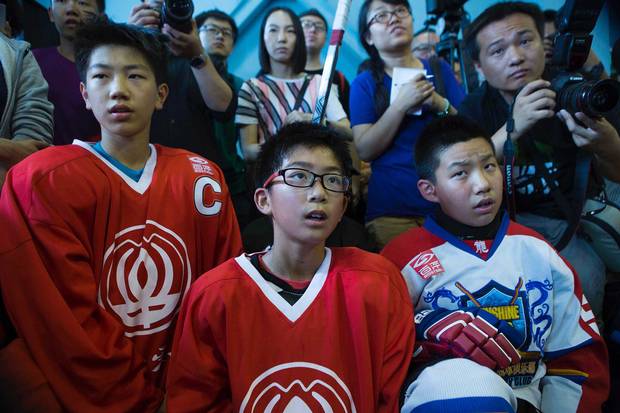
That's certainly the plan—here in North America, too. But that's an ambition he can only realize by winning.
"He can score the most goals, he can do all kinds of things. None of it is going to give him star power," says Irving Rein, a communications professor at Northwestern University who co-authored High Visibility: The Making and Marketing of Professionals Into Celebrities.
Entry into that club requires Sidney Crosby's Olympic gold medal-winning goal or Gretzky's four Stanley Cups.
In that sense, McDavid has been given a gift. The Oilers did terribly last year, after a run so bad that the NHL had to change rules to keep them from plumbing the bottom of the standings for another top first-round draft pick. McDavid's rookie season also marked the first in 46 years that no Canadian teams made it into the playoffs. It's been 23 years since the last Canadian club took home the Cup.
Fans might look at that and switch the channel—and many have, with double-digit ratings declines in the last two years. Rein, though, sees a story waiting to be written, the kind of tale that could make a hockey player into a iconic figure who sells more than Canadian Tire.
"What's McDavid's brand-forming moment? The first Canadian hockey team in God-knows-when to win the Stanley Cup—that would do it," he says. "The current state of Canadian professional hockey is dismal by any stretch of the imagination. Unprecedentedly dismal. McDavid has an incredible opportunity."
The people banking on his success see the same. Last year's Oilers losses "don't really affect his brand or ours, in the sense that no Canadian team is winning right now," says BioSteel's Celenza.
"What it's all about is who has the brightest future. And there's no future brighter than Connor McDavid's, in my opinion, in hockey. So I don't think that hurts us."
